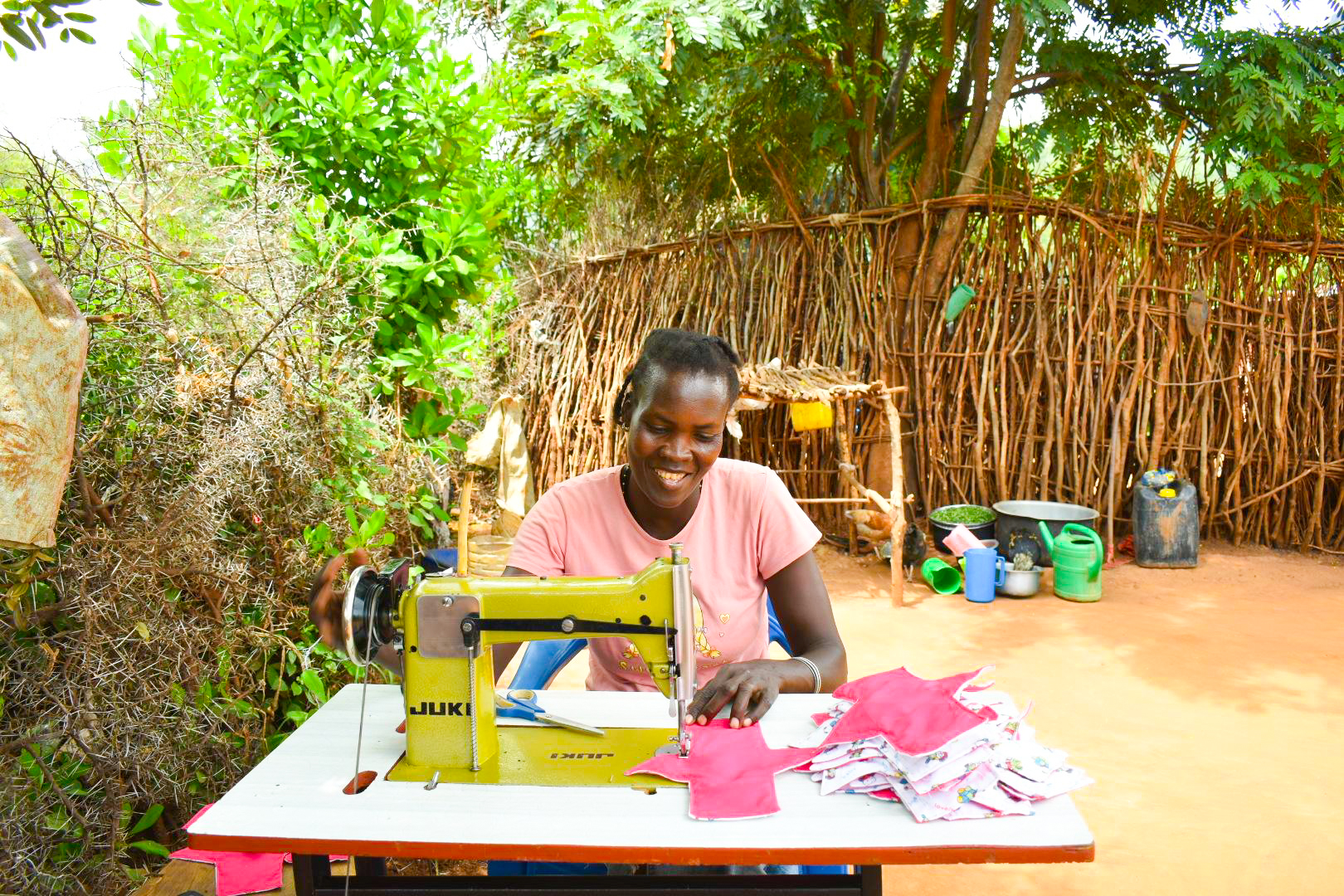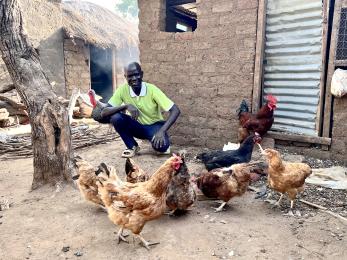A tiny seed transforms a community
The late-morning sun is already relentless over the sesame field when I get there, but about 20 neighbors chat amiably while they work. Harvest season has arrived, and with it, the optimism that comes with knowing it’s almost payday. This field belongs to Akemkwene David in northern Uganda — his neighbors have come to help him cut and dry his sesame seeds.
Mothers with small babies strapped to their backs talk happily. Children, home from school on holiday break, wander into the field behind their parents, carefully and confidently wielding small knives against the leggy, brown sesame stalks.
David is just one of the farmers that Mercy Corps has helped in Uganda. With training and education about how to grow better-quality sesame, David and his neighbors have recently improved their techniques and are reaping the benefits.
Still, there is nothing mechanized about this harvest, so the cooperation of friends and neighbors is key to completing the demanding work. During this labor-intensive season, the farmers meet at a different field each morning, helping each other harvest their crops.
Less than 10 years ago this was a far-fetched dream. The long, brutal civil war against the Lord’s Resistance Army in this region had forced everyone off their land and into displacement camps in the town centers.
David said that when they returned to their land in 2007, they were devastated. “We had no hope. But now a lot has changed because we are farming. We can sell and make money so a lot has changed from what we thought was possible before. There is a lot of improvement.”
Since the war subsided, Mercy Corps has focused on helping Ugandans build an economy that works for small farmers, so they can build better lives for their families and strengthen their communities.
Twenty years of violent conflict had damaged the fledgling economic system. Mercy Corps identified sesame as a crop with huge potential to help farmers be more successful. Farmers here already grew it on a small scale for food, but the goal was to teach them how to increase the quality and volume of their sesame and then to connect them to the international market.
With support from the Walmart Foundation, we partnered with a business called GADC. They buy organic sesame from thousands of small farmers throughout Uganda’s Acholi region and export it to buyers in Germany.
It helps everyone if the local sesame crop meets organic and other high-quality standards, so Mercy Corps has worked with GADC to create training programs for farmers like David. A network of local trainers now shares information with the farmers on how to prepare the soil, space their plantings, and harvest and handle the produce.
While I am visiting David’s sesame field, Jimmy, a GADC trainer, comes to introduce the farmers to a new kind of drying rack. Under the hot mid-day sun, Jimmy is the picture of friendly expertise and dignity in rubber boots and a double-breasted suit coat.
The farmers cut the sun-browned stalks of sesame and bundle them, and Jimmy shows them how to attach the bunches to the diagonal drying rack. Traditionally, the farmers here dry their sesame on vertical racks, but Jimmy explains that the diagonal design allows each bunch to get more air and dry more thoroughly, making for higher quality sesame.
“[It] has been so helpful. They’ve been training us how to do the best practices, like how to dry the sesame,” David says. It’s just one part of the wide range of training provided by Mercy Corps’ program. “Also they trained us to keep our money in bank accounts and not to waste it.”
The neighbors work their way through the field while the sun is still high. When sesame bundles cover the entire rack, the crowd dissipates. They’ll reconvene tomorrow morning to help another farmer. “The community is more connected now,” David tells me as we walk past a field with two oxen eating their way through the high grass.
“Now we do things in groups. We’re always linking up with each other, even helping each other in the garden,” he says. “Also after selling, since so many people want to buy animals, we combine the money together and send people to buy animals in Lira.” The livestock market is three hours away, so the farmers pool their money to share the expense of animal transport.
David and his wife, Akwero Kevin, grew three acres of sesame this year. They spread out a tarp at the base of a loaded drying rack in a second field. The sesame bunches look like they have baked in the sun. They each take a sesame bundle and whack it with a small stick. Sesame seeds rain from open pods down onto the tarp.
Kevin tells me that since they’ve been growing sesame, the roles in her family have changed. “Before, it was only the woman’s job to do most of the farm work. But now, right from land preparation to harvesting, we do together, my husband and I together,” she says. “We see the value of doing it together and what we can gain at the end.”
In the shade of their grass-roofed hut, Kevin swirls and tosses the sesame in a basket in a practiced rhythm. She shakes it thoroughly, separating the valuable seeds from the chaff.
David tells me that their situation has changed dramatically since they started growing sesame, and they’re eager to invest in their future. This year the couple expects to make 3-4 million Ugandan shillings — more than $1,000 — on their sesame crop. Throughout the region, farmers involved in Mercy Corps’ sesame program are reporting an average 100% growth in their farming income.
David and Kevin’s first priority is to pay for a good school for their four children. “I want to have a better life than I have now,” David says. “One thing I want is to send my children from the village schools to the school in the town that performs better.”
After that, like many people I spoke to in the area, they hope to build a house. Kevin nods towards her grass-roofed hut and says, “The huts are a problem every year because you have to do a lot of repairs, so we’d like to have a permanent structure in the future. I’m hopeful for the future.”
David and the couple’s 4-year-old son run their hands through the sesame. As the little seeds fall between David’s long fingers, I see the power they have to weave this family and their community together. As the heat of the day mercifully begins to loosen its grip, I also see the hard work everyone has contributed to get to this point.
The tiny seeds are proof that by working together, we can give people the resources they need to build better lives for their families and help their communities be more successful, too. David adds the day’s cleaned sesame to a large bag. When it’s full, they’ll sell it in the market. It’s almost payday.


